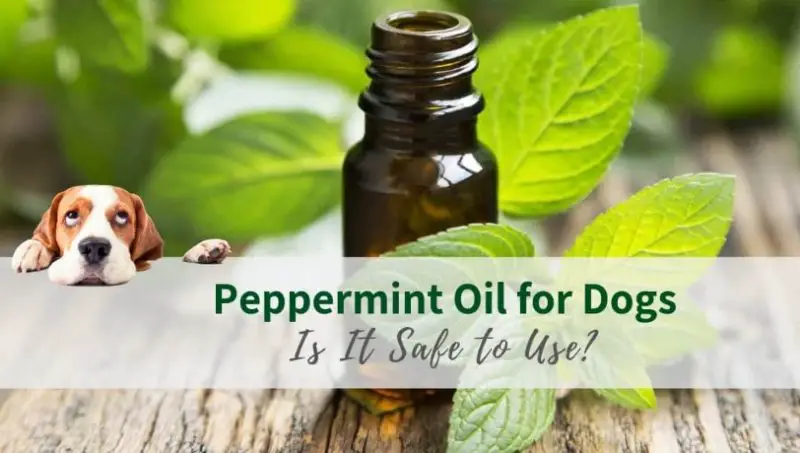Peppermint oil, with its soothing scent and cooling effects, is a popular essential oil in many households. It’s often used to treat a variety of human ailments, such as headaches, digestive issues, and muscle pain. However, when it comes to pets, especially dogs, the question arises: is peppermint oil safe for dogs?
This article explores the potential risks and benefits of peppermint oil for dogs, providing essential information you need to make an informed decision about using it around your furry friend.
Understanding Peppermint Oil

Peppermint oil is extracted from the leaves of the peppermint plant, which is a hybrid of watermint and spearmint. It contains compounds like menthol and menthone that are responsible for its refreshing aroma and cooling sensation. Peppermint oil is often used in aromatherapy, skin care products, and as a natural remedy for various health issues.
Key Components of Peppermint Oil
Peppermint oil is made up of several active ingredients, the most notable being menthol. This compound is known for its cooling effect, which is why peppermint oil is often used to relieve muscle pain and headaches. However, menthol can also cause irritation in sensitive animals, especially when ingested or applied in concentrated amounts.
The Risks of Peppermint Oil for Dogs
While peppermint oil may be safe for humans in moderate amounts, it poses several risks for dogs. Dogs have a much more sensitive sense of smell and unique metabolism compared to humans, making them more vulnerable to essential oils’ potential toxicity.
Toxicity of Menthol and Other Compounds
The primary concern when it comes to peppermint oil and dogs is its menthol content. When ingested or absorbed into the skin, menthol can cause a range of symptoms, from mild irritation to serious toxicity. Some of the most common signs of menthol poisoning in dogs include:
- Excessive drooling
- Vomiting
- Diarrhea
- Lethargy
- Difficulty breathing
- Seizures
In severe cases, peppermint oil can even lead to organ damage or death if not treated promptly. It is important to keep peppermint oil and other essential oils out of reach of pets to prevent accidental exposure.
Ingestion and Skin Absorption Risks
Peppermint oil can be dangerous if ingested by dogs. They may be tempted to lick surfaces or objects that have been treated with peppermint oil, such as cleaning products or air fresheners. Additionally, if peppermint oil is applied to the skin, it can be absorbed into the bloodstream, leading to toxic effects. The risk is heightened if the oil is applied in high concentrations or if the dog has sensitive skin.
How Peppermint Oil Affects Dogs’ Respiratory Systems
Peppermint oil has a strong, mentholated aroma, which may cause respiratory distress in some dogs. Dogs have a much more sensitive respiratory system compared to humans, and inhaling concentrated vapors of peppermint oil can irritate their airways. Symptoms of respiratory irritation include coughing, wheezing, and shortness of breath.
Risks for Dogs with Pre-existing Respiratory Conditions
If your dog has a history of respiratory issues, such as asthma, bronchitis, or allergies, using peppermint oil in any form may exacerbate these conditions. The strong scent of peppermint oil can trigger an asthma attack or worsen coughing fits in dogs with existing breathing problems. For these dogs, it’s best to avoid peppermint oil altogether.
When Is Peppermint Oil Safe for Dogs?
Although peppermint oil can be harmful to dogs, there are certain situations where it can be used safely. However, caution is always advised, and pet owners should follow these guidelines to minimize risk.
Dilution and Proper Usage
If you choose to use peppermint oil around your dog, it’s essential to dilute it properly. Never apply undiluted peppermint oil to your dog’s skin or use it in high concentrations. A small amount of diluted peppermint oil can be used in a diffuser or as part of a dog-safe homemade remedy, but it’s crucial to monitor your pet’s reaction. Always err on the side of caution and use the lowest effective dose.
Using Peppermint Oil as a Natural Pest Repellent
One of the more common uses of peppermint oil for pets is as a natural pest repellent. Peppermint oil is known to repel pests such as fleas, ticks, and mosquitoes. Some pet owners use diluted peppermint oil sprays on their dog’s coat to keep insects away. However, you should avoid spraying it near the face, eyes, or nose, as this can cause irritation.
It’s also important to note that peppermint oil should never be used in place of a veterinarian-approved flea and tick treatment. While peppermint oil may help repel pests, it is not a substitute for professional medical treatments and should be used in conjunction with other safe pest prevention methods.
Aromatherapy and Diffusers
If you plan to use peppermint oil in a diffuser, ensure that your dog has the option to leave the room if the scent becomes overwhelming. As mentioned earlier, dogs have a much stronger sense of smell than humans, and even the pleasant aroma of peppermint oil can be overpowering for them. A well-ventilated area is essential, and it’s always best to start with a low concentration to gauge your pet’s reaction.
Signs of Peppermint Oil Poisoning in Dogs
If you suspect that your dog has ingested or been exposed to peppermint oil, it’s important to act quickly. Peppermint oil poisoning can be serious, and immediate veterinary care may be necessary. Common symptoms of peppermint oil poisoning include:
- Vomiting and diarrhea
- Drooling
- Lethargy or weakness
- Rapid or shallow breathing
- Tremors or seizures
- Abdominal pain
If your dog shows any of these symptoms, contact your veterinarian or an emergency animal clinic immediately.
Alternatives to Peppermint Oil for Dogs
If you’re looking for natural remedies or oils to use around your dog, there are several safer alternatives to peppermint oil that may be better suited to your pet’s needs. Consider the following options:
Lavender Oil
Lavender oil is widely regarded as one of the safest essential oils for dogs. It has calming properties and is often used to help reduce anxiety and promote relaxation. Lavender oil can also help with skin irritations and minor cuts, but it should still be used with care. Always dilute lavender oil before applying it to your dog’s skin or using it in a diffuser.
Chamomile Oil
Chamomile oil is another safe essential oil for dogs, known for its soothing and anti-inflammatory properties. It can be helpful for calming nervous dogs and reducing skin irritation. Chamomile oil can also promote digestive health, which makes it a good option for dogs with mild tummy issues. However, as with all essential oils, it should be used in moderation and properly diluted.
Cedarwood Oil
Cedarwood oil is commonly used to repel insects, such as fleas and ticks, without the harshness of peppermint oil. It has a calming effect on dogs and can be used in a diffuser or diluted for topical use. Cedarwood is considered safe for dogs, but like all oils, it should be used with care.
Conclusion: Is Peppermint Oil Safe for Dogs?
While peppermint oil has many beneficial uses for humans, it’s not always safe for dogs. The potential risks of peppermint oil, especially in its concentrated form, can be severe for our furry friends. Menthol, a key component of peppermint oil, can cause poisoning, respiratory issues, and skin irritation in dogs. It’s important to use peppermint oil with caution, ensuring it is heavily diluted and applied only in safe, controlled environments.
If you’re considering using peppermint oil as a pest repellent, for aromatherapy, or for any other purpose, always keep your dog’s safety in mind. Consult your veterinarian before introducing any new essential oil into your dog’s environment to ensure their well-being. For safer alternatives, consider using oils like lavender, chamomile, or cedarwood, which are known to be much less harmful to dogs.
In summary, peppermint oil should be used with extreme caution around dogs, and it’s best to prioritize pet-safe alternatives for your dog’s health and safety.






